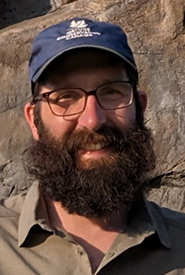The healing power of nature
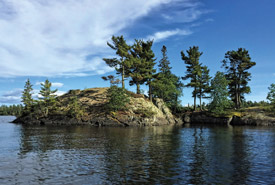
Town Island, ON (Photo by Patty Nelson)
As a conservation technician with the Nature Conservancy of Canada (NCC), I’ve come to intimately understand the rejuvenating effects of nature. During my recent visit to Town Island, located about two kilometres from the mainland on Lake of the Woods, I had the privilege of experiencing this magic first-hand.
Given the growing development pressures in the region, Town Island’s size and relatively unaltered shorelines and woodlands make it a crucial conservation initiative. The island’s biological importance has long been understood. In August 2022, NCC acquired Town Island with the support of the B'nai Brith children's summer camp (BB Camp) and several community benefactors, guaranteeing that its 82 hectares of habitat would always be protected.
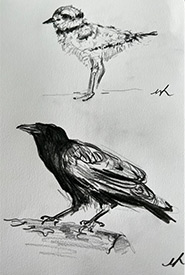
Sketches of a common raven and young killdeer during our trip, by Mirabai Alexander, NCC’s conservation biologist for northwestern Ontario. (Photo by Mirabai Alexander/NCC staff)
In July of this year, in honour of the significant contributions of all those who supported this initiative, a celebration was held at BB Camp. Everyone I spoke to at the event described how elated they were to see the island permanently protected, and from the moment I set foot on the island, I understood why.
On Town Island, I felt an immediate sense of harmony — the crashing waves, leaves rustling in the wind and the distinctive calls of eagles, gulls, blue jays and sparrows created a symphony that resonated in the air around me. The sweet scents of pine and fir wafted everywhere I went, and I felt at peace in nature.
I am not alone in this feeling, either. Science has proven that engaging our senses in nature has psychological benefits, something us nature lovers have long suspected. Recent studies have identified over 200 different ways that our interactions with nature contribute to our well-being. For example, a report from last year found that those who listened to birdsong reported decreased anxiety, and a study from this year found that smells experienced in nature influence well-being by drawing on our positive memories.
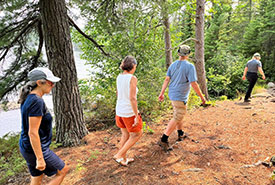
NCC staff lead a hike to Mosquito Point on Town Island. (Photo by Mirabai Alexander/NCC staff)
At a time characterized by rapid urbanization and with over 80 per cent of Canadians residing in cities, many of us see ourselves as distinct and separate from other species. Yet, we are inextricably part of nature, and this disconnect harms us and the planet. Reconnecting with the natural world is crucial, and a great place to start with this is helping younger generations enjoy the outdoors. Children’s connection to nature is incredibly powerful, and encouraging this connection has the potential to inspire the next generation of conservationists. In fact, adults who spent time outdoors as children report a higher level of motivation to care for the environment later in life.
For this reason, protecting Town Island feels especially meaningful. Today, BB Camp is the sole development on the island, and the island is also accessed by the nearby YMCA-YWCA Camp Stephens. I felt comforted knowing that where I stood, lasting memories of the natural world would continue to be built for generations.
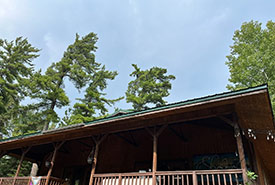
BB Camp (Photo by Mirabai Alexander/NCC staff)
As our boat left the dock at the end of the day, I felt a deep sense of connection to the environment and those devoted to its conservation. In that moment, I felt as if I was bearing witness to a force greater than myself. This experience reaffirmed the notion that caring for nature is also a form of self-care and compassion for others. With Town Island now safeguarded, thanks to the work of NCC, BB Camp and generous donors, countless future visitors will be able to experience its healing powers like I did. I hope this will be one of many environmental stewardship opportunities in the Lake of the Woods area — this is just the beginning.
The 2023 Conservation Intern Program in Ontario is proudly supported by 407 ETR.

